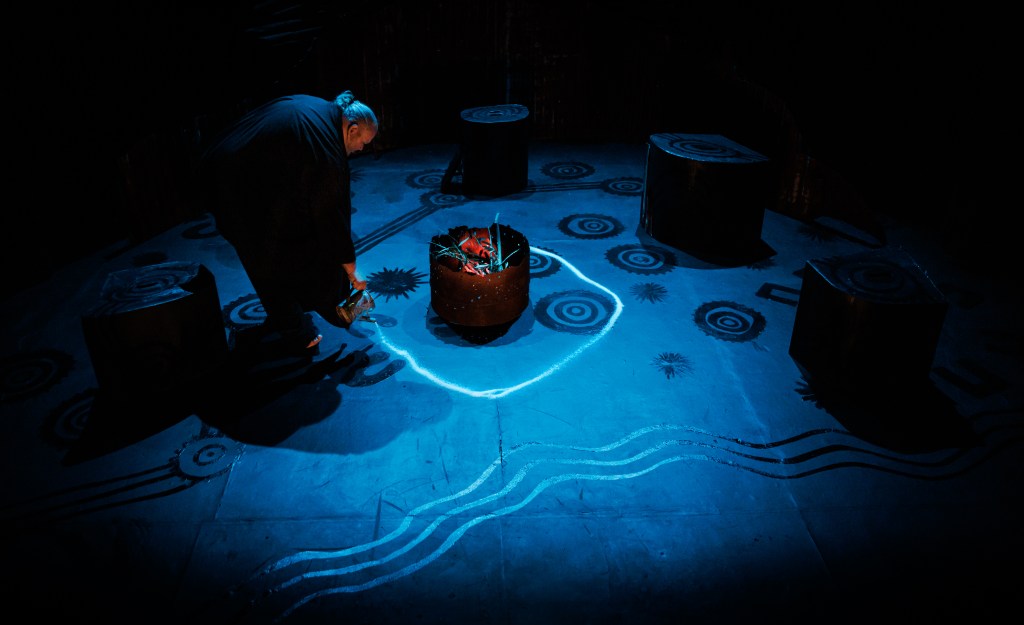Soon Australia will vote on constitutional recognition of Indigenous people. An Indigenous Trilogy at La Mama comprises three plays that show the torment of Indigenous powerlessness and why coming together after a struggle provides hope for all Australians.
When seeking understanding between cultures, it’s important to start with the voice of cultures you’re trying to understand. Three plays by Glenn Shea create a bold point of entry to a history that stretches back to the dawn of civilisation, but in the past 200 years has been a story of dispossession, distrust and disempowerment. These plays have been recognised by the RE Ross Trust and fit into the Indigenous Gothic genre famed for plays like Wesley Enoch’s Black Medea.
Shea’s suite of work is divided into three plays: Three Magpies Perched in a Tree, Masterpiece and Some Secrets Should Be Kept Secret. All three are compellingly directed by Dr Kirsty Reilly and produced by Tessa Spooner.
Three Magpies is a personal history that is also a history haunted by the spectre of broken families, broken dreams and broken notions of personal empowerment. It’s an eye-opening portrait of the criminal justice system and the extent to which the police are involved in a young Indigenous person’s life from birth and through schooling.
The most moving parts of the play are the voiceovers by recently deceased Indigenous actor Jack Charles where he shares Dreamtime stories.
While Three Magpies successfully contrasts Dreamtime stories with contemporary Indigenous life, Masterpiece underscores how fractious, itinerant and fraught with adversity this life can be. The second play in the trilogy tells the story of two people on the run from broken homes, and the solace they find through what they are able to make together.
This tale is poignant and directly told – about a young woman who meets an Indigenous artist while travelling through the Northern Territory, and poses for a portrait, with far-reaching consequences. This play is probably the most accessible of the three for a younger audience and it’s capably and cogently performed.
While it is gratifying to see the conventions of Western portraiture play such a big role in an Indigenous story, the play is least convincing when it falls back on tropes of female beauty and representational portraiture: the picture that is beautiful because it’s a picture of a beautiful woman.
It’s great, therefore, that there are original Indigenous artworks in the play by a living artist that present a new way of looking at the world.
Read: Dance review: Monsters
The final iteration of An Indigenous Trilogy, Some Secrets Should Be Kept Secret, is the most harrowing, but perhaps also the most necessary. More than the first two plays in the series, it underlines how the story of our country’s Indigenous people is a story of political but also personal and familial disempowerment.
An Indigenous Trilogy by Glenn Shea
La Mama, Melbourne
Creative team: Glenn Shea, Tessa Spooner, Valentina Serebrennikova (Design), DE (Sound), Bronwyn Pringle (Lighting), Mia Reilly-Shea, Kristel Kickett, Lauren Thuys, Dr Kirsty M Reilly (Intimacy Coach) and Lucy Payne (Trainee Intimacy Coach)
Mentees: Isabel Knight (directing), Brodie Murray (writing), Maxi Sam-Morris (lighting) and Ben Ridgeway (sound)
Three Magpies Perched in a Tree was performed from 8-27 November, Masterpiece was performed 15-27 November and Some Secrets Should Be Kept Secret was performed from 23-27 November.





